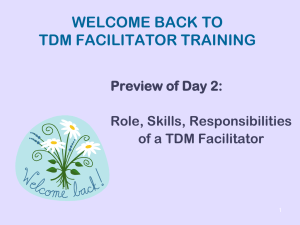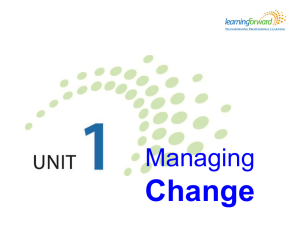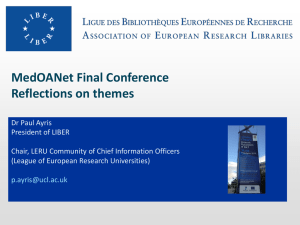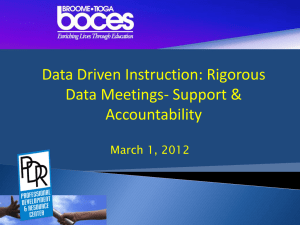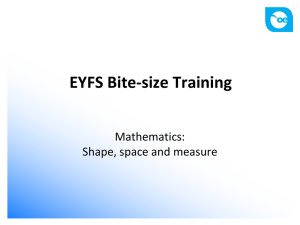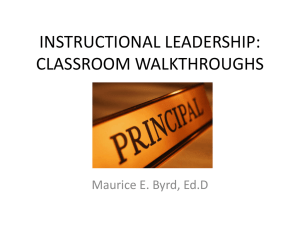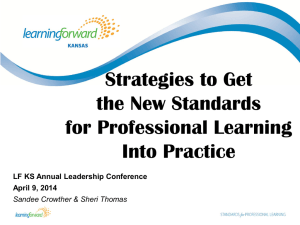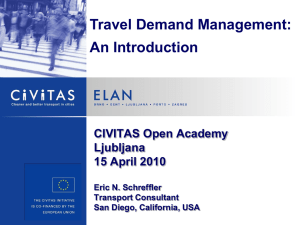Team Decision Making for Facilitators: Training Day 1
advertisement
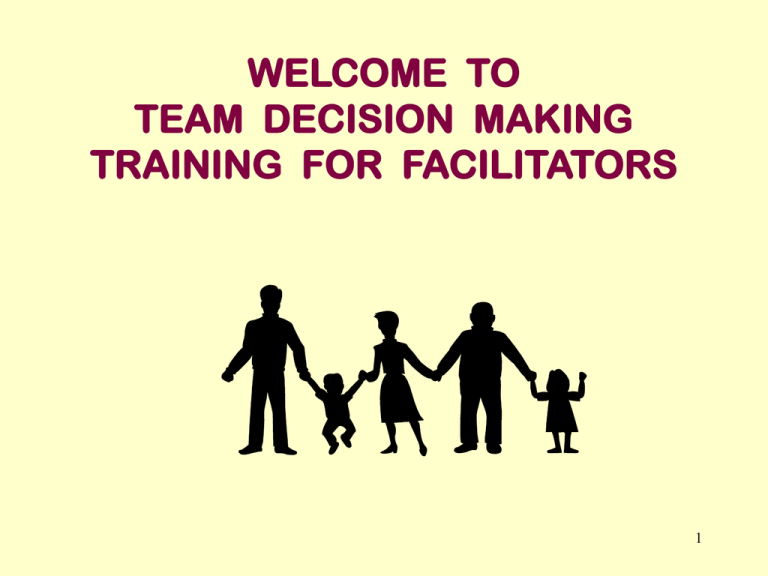
WELCOME TO TEAM DECISION MAKING TRAINING FOR FACILITATORS 1 INTRODUCTIONS YOUR NAME YOUR COUNTY ARE YOU A FULL-TIME OR AUXILLIARY FACILITATOR? 2 HOUSEKEEPING INFORMATION 3 TDM FACILITATOR TRAINING IS DESIGNED TO: Develop awareness of the Facilitator’s role in TDM Show why relationships are important before, during and after TDM meetings Build basic facilitation skills Instill confidence 4 TEAM DECISION MAKING FACILITATOR TRAINING Technical Skills Interpersonal Skills Values 5 AGENDA TRAINING BUILDS FROM ONE DAY TO THE NEXT… •FAMILY TO FAMILY •TDM OVERVIEW •PROCEDURAL BASICS •ROLE OF TDM FACILITATOR •FACILITATOR SKILLS •DEALING WITH EMOTIONS •STRUCTURE OF THE TDM •PRACTICE 6 WALK AROUND ACTIVITY REVIEW…CONSIDER… RESPOND TO EACH OF THE FOLLOWING… WHEN I THINK ABOUT THIS TRAINING AND WHAT I HOPE TO GAIN…THE BEST OUTCOME FROM THIS TRAINING WOULD BE… THE WORST OUTCOME WOULD BE… THE GREATEST STRENGTH I CAN CONTRIBUTE TO THIS TRAINING TO ASSURE ITS SUCCESS IS… THE GREATEST CHALLENGE TO USING TDM IN MY AGENCY IS… FOR ME TO FEEL COMFORTABLE AND ACTIVELY PARTICIPATE IN THIS TRAINING, OTHER MEMBERS SHOULD… ON A SCALE OF 1…10, MY CURRENT TDM FACILITATION SKILL LEVEL IS… 7 Ground “Rules” (Group Agreements/Guidelines) Are important to the team Are limited in number Are fully supported by each member Are used by each member 8 REMEMBRANCES PICTURE YOURSELF AS A CHILD… Handout 1-1 9 Annie E. Casey Foundation • Founded by Jim Casey, one of the founders of UPS, in 1948 in honor of their mother • Mission of the foundation – to help build better futures for disadvantaged children who are at risk of poor educational, economic, social, and health outcomes. 10 Child Welfare Historically A Closed System where decisions are made by individuals Most State Systems: o Are remote from the children, families, communities they serve o Focus narrowly on the individual problems when families have multiple needs o Tend to intervene when the problems are so severe…serious and expensive options o Hold themselves accountable for quantity rather than effectiveness 11 Challenges of Child Welfare Agencies Too many children are in foster care Systems are overloaded - unable to safely reunite children with their families or find permanent homes for them Less than 50% of children in need of temporary care are with foster families Children of color are vastly over-represented in group of children placed in care 12 FAMILY TO FAMILY Is a Child Welfare Reform Initiative Inclusion Community Transparency 13 FAMILY TO FAMILY • Started in 1992 in Ohio • From Alaska to New York City – many states have implemented the Initiative • In California there are 25 Family to Family sites 14 F2F Review Hand Out 2-1 PRINICPLES and VALUES • A child’s safety is paramount • Children belong in families • • Families need strong communities Public Child Welfare Systems need partnerships with the community and with other systems to achieve strong outcomes for children 15 F2F OUTCOMES A reduction in the disparities associated with race /ethnicity, gender, or age in each of the following outcomes. children being placed away from their birth families; when children come into foster care, are placed with families in their own neighborhoods or communities; children in institutional and group care and shift of resources from group and institutional care to kinship, family foster care, and family-centered services; the lengths of stay of children in placement; 16 F2F OUTCOMES children being reunified with their birth families; children re-entering placement; number of placement moves experienced by children in care; number and proportion of brothers and sisters placed together. 17 Family to Family GOALS Hand Out 2-1 18 Family to Family STRATEGIES Hand Out 2-1 • Recruiting, Developing, and Supporting Resource Families (RDS) • Building Community Partnerships (BCP) • Making Decisions as a Team (TDM) • Evaluating Results/Self Evaluation (SE) 19 2-2 BELIEF PARADIGM SHIFT TRADITIONAL ……… PRACTICE FAMILY TO FAMILY GOALS 21 TEAM DECISION MAKING VALUES THE GOAL OF TDM… Make the best possible placement-related decision with a high level of participant involvement 22 TDM IS BASED ON THE BELIEF THAT… Handout 3-1 A group can often be more effective in making good decisions than an individual Families are the experts on themselves When families are included in decisions they are able to identify their own needs and strengths Members of the family’s community add value to the process 23 BENEFITS OF TDM Handout 3-2 24 CHALLENGES TO TDM Handout 3-3 25 KEY ELEMENTS Handout 3-4 DECISION-MAKING RELATED TO PLACEMENT ISSUES PRIOR TO or IN AN EMERGENCY IMMEDIATELY FOLLOWING EVERY AGENCY PLACEMENT FOCUS ON SAFETY AND PROTECTION in the LEAST RETRICTIVE/LEAST INTRUSIVE PLACEMENT CONVENED BY WORKER OF RECORD 26 KEY ELEMENTS Handout 3-4 TEAM INCLUDES…FAMILY, SUPPORTS, SERVICE PROVIDERS, COMMUNITY REPRESENTATIVES, OTHERS INTERNAL AGENCY FACILITATION CONSENSUS IS ALWAYS THE GOAL, BUT THE AGENCY OWNS THE DECISION. INFORMATION ABOUT EACH MEETING IS COLLECTED AND ULTIMATELY LINKED TO DATA ON 27 CHILD AND FAMILY OUTCOMES TEAM DECISION MAKING… 4 CORE PROGRAM ELEMENTS Handout 3-5 #1 For ALL placement decisions #2 Held BEFORE the child’s move occurs #3 Facilitator is a dedicated position #4 Community representatives attend 28 KEY CHARACTERISTICS OF FAMILY MEETINGS Handout 3-6 CORE VALUES ARE SHARED BY ALL TDM TEAM DECISION MAKING FGDM FAMILY GROUP DECISION MAKING WRAP WRAPAROUND 29 FUNDAMENTALS OF A QUALITY PLACEMENT PROCESS HANDOUT 3-7 • Removal of a child from their parents should only occur when there is imminent risk of serious harm AND in-home services / protective supports cannot provide safety. • Evaluation of a child’s unique needs must be part of the placement decision. • The trauma of separation must be weighed with other factors to determine the necessity of placement. • The voices of youth must be heard. • Assessing safety and risk is ongoing 30 FUNDAMENTALS OF A QUALITY PLACEMENT PROCESS HANDOUT 3-7 • Out-of-home care should be in the least restrictive placement that meets the child’s needs. • Relatives must be the first consideration • Parents’ involvement can be invaluable. • Moves hurt kids. • Reunification should occur as soon as it is safe. • An alternative permanent plan must be made if reunification is not possible within a reasonable time. • Youth facing emancipation need guidance & support. 31 A QUALITY PLACEMENT PROCESS • Think of Yourself Facilitating a TDM • Review Handout • How Will You Model/Encourage/Ensure that the Fundamental Placement Rules are a Part of Your TDMs? 32 CRITERIA FOR CONVENING A TDM MEETING Handout 4-1 WORKER IS FACING DECISION RELATED TO CUSTODY AND OR PLACEMENT. WORKER CONSULTS WITH SUPERVISOR--THEY EXPLORE OPTIONS. IF AGREEMENT, WORKER SCHEDULES; INFORMS PARENTS OF TDM & PURPOSE; INVITES PARENTS and THEIR SUPPORTS; INVITES OTHERS… AT TDM, WORKER INVITES ASSISTANCE IN EXPLORING ALTERNATIVES & DEVELOPING A PLAN THAT ENSURES SAFETY FOR THE CHILD IN THE LEAST RESTRICTIVE / INSTRUSIVE MANNER POSSIBLE. 33 SCHEDULING A TDM MEETING Handout 4-2 When? Why? Who Might Be Present? DEPENDS ON THE PURPOSE OF THE MEETING REMOVAL - Emergency or Considered PLACEMENT PRESERVATION PERMANENT PLANNING 34 Handout 4-3 POTENTIALLY THREE TYPES OF “COMMUNITY” PEOPLE AT TDM Support Persons Invited by the Family Service Providers Specific “Community Representatives” Invited by the Agency Key Is: “Will the Family Likely Relate to This Person as a Member of Their [the Family’s] Own ‘Community’ However They Define That?” 35 Serves as a Natural Ally and Potential Advocate for Birth Parents at a TDM; Represents the Birth Family’s “Community;” The Supportive Connection Can Continue Throughout the Family’s Involvement with the System and Beyond; May Know of Resources which Could Support the Family Especially Those Available within the Family’s Community; 36 Makes the Birth Family Feel More Comfortable in Whatever Way They Can; Helps the Agency’s Staff and Its Partners Better Understand the Family’s Community of Origin Especially Its Strengths; Assists Family in Understanding the Agency’s Concerns in Relation to Safety and Risk; Participates in the Meeting Especially Sharing Ideas for Ensuring the Child’s Safety While 37 Supporting the Family. DEFINITION OF CONSENSUS Consensus is a decision that has been reached when most members of a team agree on a clear option and the few who don’t agree feel that they have had a reasonable opportunity to influence that choice. Consensus is a mindset as well as a process. 38 CONSENSUS IS ABOUT… Handout 4-4 • HAVING A CHANCE TO STATE YOUR VIEWS AND PREFERENCES REGARDING A RESOLUTION OF THE MATTER UNDER DISCUSSION • FEELING HEARD YET UNDERSTANDING THAT OTHER MEMBERS MAY PREFER A CONCLUSION DIFFERENT FROM THE ONE YOU WOULD LIKE • A BELIEF THAT EITHER RESOLUTION WILL PROTECT THE CHILD (REN) AND SUPPORT AGENCY VALUES AND POLICIES • GIVEN THE LIMITATIONS OF TIME AND NEED FOR A DECISION, FULLY SUPPORTING THE CONCLUSION PREFERRED BY OTHERS IN THE GROUP 39 • DEMONSTRATING FULL SUPPORT OF THE GROUP’S DECISION ONCE THE MEETING IS OVER Levels of Decision Making Handout 4-4 Consensus with Participants Is the Goal, However, It Is Not Always Achieved If Consensus Is Not Reached with All, Facilitator Determines if Participating Child Welfare Staff Agree If All Agency Staff Do Not Agree, the Facilitator Invites Social Worker to Make the Decision 40 “Let’s Keep Our Balance” TDM Poetry How many Of who Makes a perfect TDM stew 41 CRITICAL ISSUES at Removal Handout 4-5 Why must removal be considered? What are the risk factors? What must change to keep the child(ren) safe? What does the family believe are their needs? What are their ideas to ensure safety and protection? Family strengths? What does “going well” look like for the family? What information can other participants provide? What have been the reasonable efforts? How accurate is information shared? What is missing? What services can meet family’s needs? Have we explored informal, natural, non traditional, neighborhood supports? 42 CRITICAL ISSUES: Handout 4-6 Placement Preservation Can additional services/supports maintain placement? Caregivers needs addressed? Plan for crisis support? Is a change in level of care needed. Will a less restrictive level of care keep the child safe and support the case plan goal? How can stability be maintained for this child? Are all of child’s needs being met? Is there a transition plan? Are the FFA contract expectations being met? 43 CRITICAL ISSUES: Reunification Handout 4-7 All risks and safety concerns reduced or eliminated? Have all services been completed? Services for parent/child continuing? Current living situation, financial, child care, etc? Additional community supports needed? How long will agency remain involved with family? Acknowledge and celebrate the accomplishment 44 CRITICAL ISSUES: Other Permanency Handout 4-8 Have we assessed the children’s attachment to the parents? Have reasonable efforts been made? What are the plans for continuing contact? How does this situation meet PPLA guidelines? Is the legal guardian financially capable of meeting the child’s needs? 45 STRENGTH-BASED ASSESSMENT ITS ROLE IN TDM Handout 5-1 • WE HISTORICALLY DEFINED PROBLEMS AND GAVE ADVICE – EMPOWERING THE PROBLEM AND DISEMPOWERING THE PERSON • TDM PROMOTES WAYS TO ENSURE SAFETY BY ENCOURAGING USE OF RESOURCES, STRENGTHS OF FAMILY, FRIENDS, RELATIVES, COMMUNITIES • LOOKING FOR STRENGTHS GENERATES COOPERATION, POSITIVE ENERGY, CREATIVITY 46 TDM UNDERLYING VALUES AND BELIEFS Handout 5-1 • FAMILIES HAVE STRENGTHS AND CAN CHANGE • STRENGTHS ARE WHAT ULTIMATELY RESOLVE ISSUES OF CONCERN • LANGUAGE REFLECTS THINKING • RESPECT IS THE ACTIVE INGREDIENT IN STRENGTHENING FAMILIES • EXPLORING THE RESERVOIR OF STRENGTHS IN THE FAMILY AND COMMUNTY HELPS TO RESOLVE ISSUES OF CONCERN 47 TDM UNDERLYING VALUES AND BELIEFS Handout 5-1 • TREAT FAMILIES LIKE THE EXPERTS THAT THEY ARE; – Ask…what is your best thinking, how can things get better? – Listen to ideas; support them when you can – Look for good intent in every idea and build on it 48 TDM IS A TOOL FIND AND BUILD ON FAMILY’S RESOURCES Handout 5-1 TDM… • GIVES THE FAMILY AN OPPORTUNITY TO SHARE THEIR BEST THINKING ABOUT WORKING OUT SOLUTIONS • GIVES THE FAMILY AN OPPORTUNITY TO BRING IN THEIR SUPPORT SYSTEMS PLUS • THE PROCESS CAN STRENGTHEN THE SOCIAL WORKER AND FAMILY • THE JOB BECOMES MORE PLEASANT • FAMILIES LIKE STRENGTHS ACKNOWLEDGED -THEY RECEIVE CREDIT FOR THEIR EFFORTS 49 CHARTING … HANDOUT 5-2 • KEEPS US FOCUSED • HELPS US HEAR • PROMOTES OUR PARTICIPATION • ENLARGES OUR THINKING • STRUCTURES THE MEETING • IS CORE TO THE PROCESS 50 CHARTING TIPS HANDOUT 5-3 • PRE-LABEL CHARTS • WRITE LARGE • AVOID NUMBERING • USE LARGE TIPPED MARKERS • AVOID RED, YELLOW & ORANGE 51 TOOLS FOR IMPLEMENTATION & REINFORCEMENT Handouts 6-1 through 6-9 10 TIPS DIRECTORS SOCIAL WORKERS CAREGIVERS CASA SUPERVISORS ATTORNEYS COMMUNITY REPRESENTATIVES 52 DAY IS DONE GOOD JOB TODAY! Enjoy The Evening!! See You at 9 AM 53

